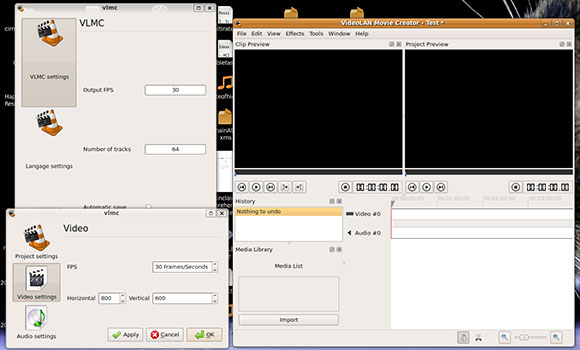Some open source software, fairly or unfairly, has acquired a reputation for being “poor man’s” clones of commercial projects, outside the popular acceptance of Linux servers and Firefox browsers. Video software, worse, has typically been labeled unusable, because of the primitive state of some early projects.
But make no mistake: the real appeal of open source video software is to take a bite out of the hassle and often-sluggish performance of bigger, aging commercial apps and frameworks.
That’s a lesson many users of VLC, the stripped-down but high-performance multi-platform video player, have already learned. It’s a server. It’s a player. It’s (as of 1.0) a basic video conversion tool. It runs everywhere (Mac, Windows, Linux). In short, it’s all of the things QuickTime Player once promised to be. The need for an open alternative has become plainer with the release of QuickTime X, which looks slicker but strips out some essential features of the previous QuickTime Pro. (See discussion from frustrated users on the Apple forums.)
One thing QuickTime Pro used to do is quick-and-dirty video editing, for those times when you don’t want to fire up your whole editor. QuickTime X does that, too, but not as efficiently, not with as many export formats, and not on Linux.
Now, the VLC folks are readying a companion to their player called VLMC. It’s in a very early state, but it could be the editor you’re missing. And VLMC is part of an all-out onslaught to finally bring open video to the masses. VLC is based on FFMPEG, which is not the most developer-friendly video framework (though it is very capable and fast). But see also PiTiVi, which I mentioned as one of the things that makes me excited about 2010. If VLMC is a QuickTime Pro replacement, PiTiVi could be a (more lightweight) iMovie. And it should be friendlier to developers, too, with support for the GStreamer framework and Python coding. (At the high end, don’t forget options like Blender, which also makes use of FFMPEG. And since these apps share common plumbing, the rising tide could lift all ships.)
One note to developers — yes, JACK support is a good idea.
In short, it looks like open source developers may volunteer to step up to pick up the slack left by commercial developers – even ones that had traditionally inspired fuzzy, warm glows, like Apple. And with Linux-based tablets on the way, this could be even more important, in case Apple decides to run an iPhone-style OS on its expected tablet instead of MacOS.
See Download Squad’s Brad Linder (always a reliable source of audio and visual news), from just before the holidays:
VLC creators working on a cross-platform video editing app
Also on Lifehacker
And see the official site, which has code available now and a pre-release promised “real soon now”:
http://vlmc.org/
